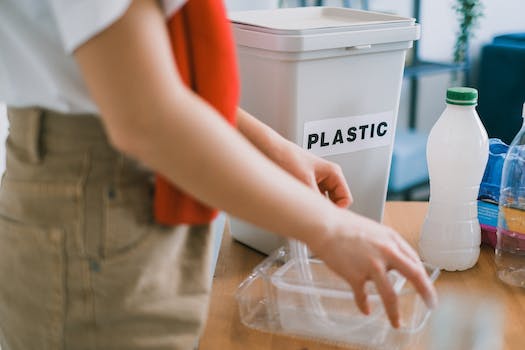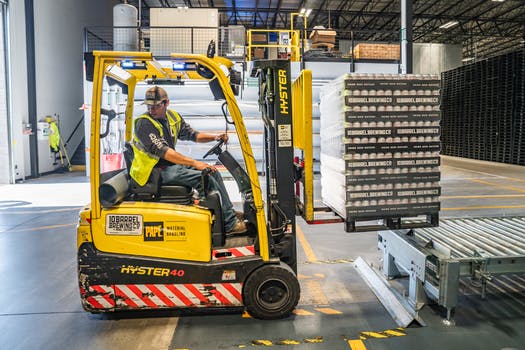How To Start A Business Recycling Plastic
“Transforming plastic waste into profit: A beginner’s guide to starting a successful recycling business.”
Introduction
Starting a business recycling plastic can be a great way to contribute to the environment while also making a profit. In this guide, we will discuss the steps you need to take to start a successful plastic recycling business.
Benefits of Recycling Plastic for Your Business
Starting a business that recycles plastic can be a great way to make a positive impact on the environment while also generating income. Not only does recycling plastic help reduce waste in landfills and oceans, but it also has numerous benefits for your business. In this article, we will explore the benefits of recycling plastic for your business and how to get started.
Firstly, recycling plastic can help your business save money. By recycling plastic, you can reduce the amount of waste your business produces, which can lead to lower waste disposal costs. Additionally, recycled plastic can be used to create new products, which can be sold for a profit. This can help your business generate additional revenue while also reducing your environmental impact.
Secondly, recycling plastic can help your business improve its reputation. Consumers are becoming increasingly aware of the impact that businesses have on the environment, and many are actively seeking out companies that are environmentally responsible. By recycling plastic, your business can demonstrate its commitment to sustainability and attract environmentally conscious customers.
Thirdly, recycling plastic can help your business comply with environmental regulations. Many countries have laws and regulations in place that require businesses to reduce their environmental impact. By recycling plastic, your business can demonstrate compliance with these regulations and avoid potential fines or legal issues.
Finally, recycling plastic can help your business reduce its carbon footprint. The production of new plastic requires a significant amount of energy and resources, which contributes to greenhouse gas emissions. By recycling plastic, your business can help reduce the demand for new plastic and reduce its carbon footprint.
Now that we have explored the benefits of recycling plastic for your business, let’s discuss how to get started. The first step is to research the recycling market in your area. Look for local recycling facilities that accept plastic and find out what types of plastic they accept. You may also want to research the demand for recycled plastic in your area to determine if there is a market for your products.
Once you have a better understanding of the recycling market in your area, you can start collecting plastic. This can be done by setting up collection bins at your business or by partnering with other businesses or organizations to collect plastic. You may also want to consider offering incentives for customers or employees who bring in plastic for recycling.
After you have collected enough plastic, you can start the recycling process. This typically involves sorting the plastic by type and cleaning it to remove any contaminants. Once the plastic is clean, it can be shredded and melted down to create new products.
In conclusion, starting a business that recycles plastic can have numerous benefits for your business. By recycling plastic, you can save money, improve your reputation, comply with environmental regulations, and reduce your carbon footprint. To get started, research the recycling market in your area, collect plastic, and start the recycling process. With a little effort and dedication, you can make a positive impact on the environment while also generating income for your business.
Steps to Start a Plastic Recycling Business

Starting a business recycling plastic can be a great way to make a positive impact on the environment while also making a profit. With the increasing awareness of the importance of recycling, there is a growing demand for businesses that can recycle plastic waste. If you are interested in starting a plastic recycling business, here are some steps to help you get started.
Step 1: Conduct Market Research
Before starting any business, it is important to conduct market research to determine the demand for your product or service. In the case of a plastic recycling business, you need to research the types of plastic waste that are in demand, the prices that recyclers are willing to pay for them, and the competition in your area. You can also research the regulations and laws that govern the recycling industry in your area.
Step 2: Develop a Business Plan
Once you have conducted market research, you need to develop a business plan. This plan should include your business goals, target market, marketing strategies, financial projections, and operational plan. Your business plan will serve as a roadmap for your business and will help you secure funding from investors or lenders.
Step 3: Secure Funding
Starting a plastic recycling business requires a significant amount of capital. You will need to purchase equipment, rent or purchase a facility, and hire employees. You can secure funding from investors, lenders, or government grants. You can also consider crowdfunding or partnering with other businesses.
Step 4: Obtain Licenses and Permits
Before you can start your plastic recycling business, you need to obtain the necessary licenses and permits. These may include a business license, environmental permits, and zoning permits. You may also need to register with the local or state government.
Step 5: Purchase Equipment
To start a plastic recycling business, you will need to purchase equipment such as shredders, grinders, and extruders. You can purchase new or used equipment, depending on your budget. You should also consider the maintenance and repair costs of the equipment.
Step 6: Hire Employees
Starting a plastic recycling business requires a team of employees to operate the equipment, sort and process the plastic waste, and manage the business operations. You should hire employees with experience in the recycling industry or provide training to new employees.
Step 7: Market Your Business
Once you have set up your plastic recycling business, you need to market your business to attract customers. You can use social media, advertising, and networking to promote your business. You can also partner with other businesses or organizations to increase your visibility.
In conclusion, starting a plastic recycling business requires careful planning, research, and investment. However, it can be a rewarding and profitable business that makes a positive impact on the environment. By following these steps, you can start your own plastic recycling business and contribute to a sustainable future.
Equipment Needed for Plastic Recycling Business
Starting a business recycling plastic can be a great way to make a positive impact on the environment while also earning a profit. However, before you can get started, you’ll need to invest in some equipment to help you process and recycle the plastic.
The first piece of equipment you’ll need is a shredder. This machine is used to break down the plastic into smaller pieces, making it easier to process. There are many different types of shredders available, ranging from small, hand-cranked models to large, industrial machines. The type of shredder you choose will depend on the amount of plastic you plan to process and the size of your operation.
Once the plastic has been shredded, it needs to be washed to remove any dirt, debris, or contaminants. This is where a washing line comes in. A washing line typically consists of a series of tanks or vats filled with water and cleaning agents. The shredded plastic is fed into the tanks, where it is agitated and scrubbed to remove any impurities. After the plastic has been washed, it is dried using a centrifuge or other drying equipment.
After the plastic has been cleaned and dried, it needs to be melted down and formed into new products. This is where an extruder comes in. An extruder is a machine that melts the plastic and then forces it through a die to create a specific shape or form. For example, an extruder can be used to create plastic pellets, which can then be sold to manufacturers who use them to make new products.
In addition to these basic pieces of equipment, there are a few other items you may need to invest in to start your plastic recycling business. For example, you may need a forklift or other heavy equipment to move large quantities of plastic around your facility. You may also need storage tanks or silos to hold the shredded plastic before it is washed and processed.
It’s important to note that starting a plastic recycling business can be a significant investment, both in terms of time and money. However, if you’re committed to making a positive impact on the environment and are willing to put in the effort, it can be a rewarding and profitable venture.
When choosing equipment for your plastic recycling business, it’s important to do your research and choose high-quality, reliable machines that will last for years to come. You may also want to consider purchasing used equipment to save money, but be sure to thoroughly inspect any used machines before making a purchase.
In addition to equipment, you’ll also need to consider other factors such as permits, licenses, and insurance. Depending on where you live, there may be specific regulations and requirements you need to meet in order to operate a plastic recycling business. Be sure to do your research and consult with local authorities to ensure you’re in compliance with all applicable laws and regulations.
Starting a business recycling plastic can be a challenging but rewarding endeavor. By investing in the right equipment and taking the time to do your research, you can create a successful business that not only benefits the environment but also provides a valuable service to your community.
Marketing Strategies for Your Plastic Recycling Business
Starting a business recycling plastic can be a great way to make a positive impact on the environment while also making a profit. However, like any business, it requires careful planning and effective marketing strategies to succeed. In this article, we will discuss some marketing strategies that can help your plastic recycling business thrive.
First and foremost, it is important to identify your target market. Who are the people or businesses that are most likely to use your services? Are you targeting individuals who want to recycle their household plastic waste, or are you targeting businesses that generate large amounts of plastic waste? Once you have identified your target market, you can tailor your marketing strategies to reach them effectively.
One effective marketing strategy is to create a strong online presence. This can include creating a website that showcases your services and provides information about the benefits of recycling plastic. You can also use social media platforms like Facebook, Twitter, and Instagram to reach a wider audience. By regularly posting updates about your business and sharing informative content about plastic recycling, you can build a following and attract new customers.
Another effective marketing strategy is to partner with other businesses or organizations that share your values. For example, you could partner with a local environmental group to promote your services and raise awareness about the importance of recycling plastic. You could also partner with businesses that generate large amounts of plastic waste, such as restaurants or grocery stores, to offer them a convenient and cost-effective way to recycle their plastic.
In addition to online marketing and partnerships, it is important to have a strong presence in your local community. This can include attending local events and festivals to promote your business and educate people about plastic recycling. You could also offer educational workshops or seminars to schools, community groups, or businesses to raise awareness about the benefits of recycling plastic.
Finally, it is important to offer competitive pricing and high-quality services to attract and retain customers. This can include offering flexible pickup and drop-off options, providing convenient payment methods, and ensuring that your recycling process is efficient and effective. By providing excellent customer service and delivering on your promises, you can build a loyal customer base and establish a strong reputation in your community.
In conclusion, starting a business recycling plastic can be a rewarding and profitable venture. By identifying your target market, creating a strong online presence, partnering with other businesses and organizations, having a strong local presence, and offering competitive pricing and high-quality services, you can effectively market your business and attract new customers. With dedication and hard work, your plastic recycling business can make a positive impact on the environment while also achieving financial success.
Challenges and Solutions in Starting a Plastic Recycling Business
Starting a business recycling plastic can be a challenging but rewarding venture. With the increasing awareness of the negative impact of plastic waste on the environment, there is a growing demand for businesses that can recycle plastic and turn it into useful products. However, like any other business, starting a plastic recycling business comes with its own set of challenges. In this article, we will explore some of the challenges you may face when starting a plastic recycling business and some solutions to overcome them.
One of the biggest challenges in starting a plastic recycling business is finding a reliable source of plastic waste. While there is an abundance of plastic waste in the world, not all of it is suitable for recycling. Some plastics are contaminated with other materials, making them difficult to recycle. Others are simply not cost-effective to recycle. To overcome this challenge, you need to do your research and find out where you can source high-quality plastic waste that is suitable for recycling. You may need to establish partnerships with local businesses or waste management companies to ensure a steady supply of plastic waste.
Another challenge in starting a plastic recycling business is the high cost of equipment and machinery. Recycling plastic requires specialized equipment and machinery that can be expensive to purchase and maintain. To overcome this challenge, you may need to explore financing options such as loans or grants. You can also consider leasing equipment or purchasing used machinery to reduce your initial investment.
One of the most significant challenges in starting a plastic recycling business is the lack of awareness and education about the benefits of recycling. Many people still do not understand the importance of recycling plastic and may not be willing to pay for recycled products. To overcome this challenge, you need to educate your target market about the benefits of recycling and the positive impact it can have on the environment. You can also offer incentives such as discounts or rewards for customers who purchase your recycled products.
Another challenge in starting a plastic recycling business is the complex regulations and permits required to operate. Recycling plastic is a highly regulated industry, and you need to comply with various environmental and safety regulations. To overcome this challenge, you need to do your research and ensure that you have all the necessary permits and licenses to operate your business. You may also need to invest in training and certification for your employees to ensure that they are knowledgeable about the regulations and safety procedures.
In conclusion, starting a plastic recycling business can be a challenging but rewarding venture. To overcome the challenges, you need to do your research, find a reliable source of plastic waste, invest in equipment and machinery, educate your target market, and comply with regulations and permits. With the increasing demand for recycled products, there is a significant opportunity for businesses that can recycle plastic and turn it into useful products. By overcoming the challenges and providing high-quality recycled products, you can make a positive impact on the environment and build a successful business.
Conclusion
Conclusion: Starting a business recycling plastic requires careful planning, research, and investment. It is important to identify the types of plastic that can be recycled, the equipment needed, and the market demand for recycled plastic products. Developing a business plan, securing funding, and obtaining necessary permits and licenses are also crucial steps. With dedication and hard work, a successful plastic recycling business can be established, contributing to a more sustainable future.





